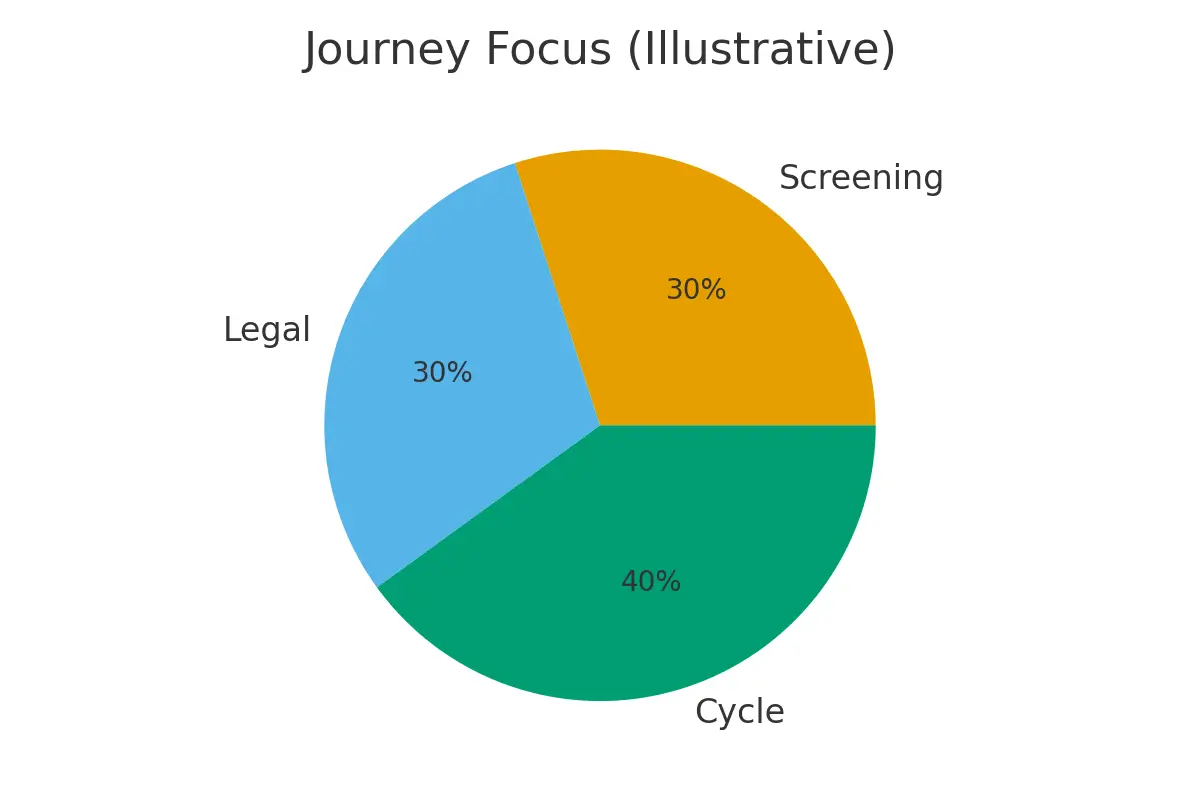
This article explains known vs anonymous donors — trade-offs and safeguards within the Donor Options (Eggs vs Embryos vs Sperm) pathway. We focus on practical choices that influence outcomes, budgets, relationships, and timelines—so you can move forward with confidence.
What It Is
Known vs Anonymous Donors — Trade-offs and Safeguards in plain English:
a comparison of working with a donor you personally know (family, friend, acquaintance) versus selecting an anonymous donor through a bank or agency. Each path affects legal protections, emotional boundaries, genetic transparency, future contact, and the long-term wellbeing of donor-conceived children.
Upstream choices—especially legal agreements, screening, and communication—directly influence downstream results such as cycle efficiency, future family planning, and emotional stability.
Who It Helps
This pathway supports:
- Individuals or couples deciding between a friend/family donor and a bank-provided donor
- Those concerned about genetics, transparency, or control over donor traits
- Patients managing complex histories, age-related decline, or poor prior cycle response
- Families wanting clarity on future contact arrangements for the donor-conceived child
- Anyone needing guidance on which option fits their emotional, medical, and financial landscape
It also highlights when to consider another path based on medical history, labs, imaging, relationship dynamics, and treatment goals.
Step-by-Step
A simple workflow with timing checkpoints to protect embryo quality and reduce stress:
- Clarify medical indication — why egg, sperm, or embryo donation is needed.
- Choose donor type — known vs anonymous, or hybrid/open-ID.
- Screening and evaluation — medical, infectious-disease, genetic, and psychological clearance.
- Legal agreements — rights, responsibilities, future contact, and boundaries.
- Match finalization — documenting expectations on communication and updates.
- Cycle coordination — syncing donor and recipient timelines if using eggs.
- Embryology planning — fertilization method, embryo creation, storage.
- Transfer and follow-up — medically optimized transfer timing.
Each step avoids surprises, protects relationships, and maintains clinical safety.
Pros & Cons
Known Donors
Pros:
- More personal connection and transparency
- Potentially lower donor fees
- Familiar genetics, cultural background, or physical traits
- Opportunity for long-term, mutually agreed contact
Cons:
- Can introduce emotional complexity or family pressure
- Relationship dynamics may shift
- Requires careful legal boundaries
- Not always medically or genetically suitable
Anonymous Donors
Pros:
- Clear boundaries and privacy
- Professional screening and proven donor pools
- Faster, more predictable timelines
- Reduced emotional complexity
Cons:
- Limited personal information
- Future contact may be restricted or impossible
- Higher upfront costs with agencies or banks
- Less long-term clarity for donor-conceived children
Costs & Logistics
Typical expenses and process considerations include:
- Donor bank or agency fees (for anonymous donors)
- Legal contracts (mandatory for known donors)
- Screening: medical, genetic, psychological
- Cycle medication and monitoring
- Logistics for travel, coordination, and storage
- Billing controls and prior authorizations
A simple cost-tracking system prevents billing surprises and helps map out cash-flow needs early.
What Improves Outcomes
Actions with real impact:
- Comprehensive screening of all donors—known or anonymous
- Independent legal representation for donors and intended parents
- Early psychological counseling to define expectations
- Clear agreement on future contact and boundaries
- Confirming medical suitability before emotional commitments
Actions that rarely change outcomes:
- Over-emphasis on appearance rather than health/genetics
- Rushing legal steps
- Choosing a donor solely to “save money” without medical clearance
Case Study
A couple initially preferred a known donor—a close friend—but felt uncertain about long-term boundaries. Through structured discussions, medical screening revealed a genetic incompatibility, preventing a failed cycle. The couple chose an open-ID anonymous donor instead. With clear legal terms, transparent medical records, and predictable timelines, they moved from confusion to a confident plan without damaging their friendship.
Mistakes to Avoid
- Skipping psychological screening with a known donor
- Assuming verbal agreements are enough—legal contracts are essential
- Focusing only on donor traits instead of medical suitability
- Ignoring future contact preferences for donor-conceived children
- Starting a cycle before all parties receive independent legal advice
- Underestimating emotional dynamics with family or friends
FAQs
Q. Is a known donor always cheaper than an anonymous donor?
Ans. Not always. While you may save on donor-bank fees, legal, psychological, and medical requirements often offset the cost.
Q. Can a child contact an anonymous donor later?
Ans. Some programs allow “open-ID” contact at adulthood, but fully anonymous donors may remain unreachable. Policies vary by bank and country.
Q. What legal protections are mandatory with a known donor?
Ans. Separate legal counsel, clear parentage agreements, confidentiality terms, and defined expectations for future contact.
Q. Is genetic screening still required if I know the donor personally?
Ans. Yes—personal familiarity does not replace the need for medical and genetic safety checks.
Q. How do I choose between known and anonymous donors?
Ans. Consider relationship dynamics, emotional boundaries, legal comfort, financial capacity, and the long-term interests of the future child. Your clinic and counselor can help map the best fit.
Next Steps
- Free 15-min nurse consult
- Upload your labs
- Get a personalized cost breakdown for your case
Related Links

Dr. Kulsoom Baloch
Dr. Kulsoom Baloch is a dedicated donor coordinator at Egg Donors, leveraging her extensive background in medicine and public health. She holds an MBBS from Ziauddin University, Pakistan, and an MPH from Hofstra University, New York. With three years of clinical experience at prominent hospitals in Karachi, Pakistan, Dr. Baloch has honed her skills in patient care and medical research.





